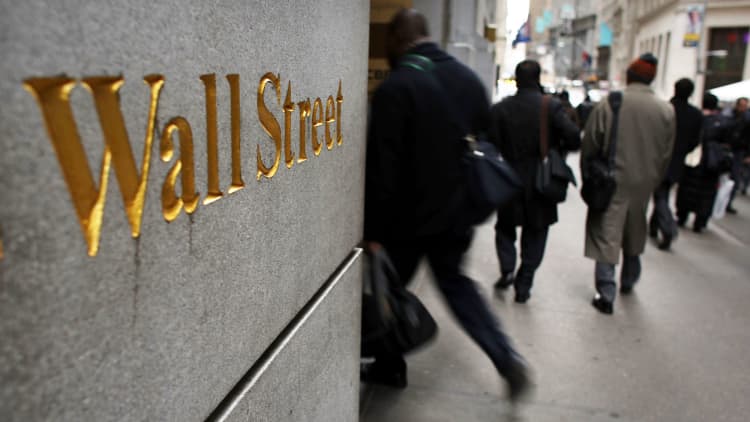
U.S. equities closed lower on Thursday, with real estate falling around 1 percent, as investors eagerly awaited President-elect Donald Trump's inauguration.
"Everyone is just waiting for the inauguration," said Jeremy Klein, chief market strategist at FBN Securities. "The market just feels a little heavy." He also said: "When you start seeing volatility in other macro markets — specifically FX — that's going to take its toll on stocks." The U.S. dollar spiked against a basket of currencies on the back of strong U.S. economic data.
The Dow Jones industrial average briefly fell about 100 points in afternoon ET before closing about 70 points lower, with Goldman Sachs contributing the most losses. The index also recorded a five-day losing streak.
"I think this is a pause ahead of the inauguration because there is so much policy uncertainty," said Kate Warne, investment strategist at Edward Jones. "We don't know what they will be focusing on first." Trump is set to take the oath of office on Friday.
The S&P 500 dropped around a third of a percent, with real estate leading decliners. The Nasdaq composite fell 0.3 percent.
"Part of it is people taking profit off the table," said John Traynor, chief investment officer at People's United Bank. "We were surprised by the November-December rally, so taking profit off the table the day before the inauguration makes sense."
Stocks in the United States rallied to record highs following Trump's victory in November, on the back of expectations for lower corporate taxes, more government spending and deregulation of certain sectors.
"The stock market tends to like a straightforward story, so if the new administration concentrates on its pro-growth policy actions, the narrative stays relatively simple and shares may find good reasons to continue their climb," Robert Landry, portfolio manager at USAA, said in a note.
"But if other priorities compete for the president's energy and focus — immediate repeal of the Affordable Care Act, creation of costly trade barriers and any number of foreign policy actions, just to name a few — the growth story could get muddled and the markets choppy," Landry said.
Several Trump cabinet nominees were testified before Congress, including Treasury secretary designate Steven Mnuchin. In his testimony, Mnuchin denied that OneWest Bank — a bank he owned — was a "'foreclose machine.' This is not true. On the contrary, I was committed to loan modifications intended to stop foreclosures," he said.
Mnuchin also expressed concerns that the "Volcker Rule" — a component of the Dodd-Frank law meant to block banks from speculating with customers' money — is actually hurting the country's financial system by limiting liquidity.
In economic news, weekly jobless claims dropped 15,000 to 234,000, around their lowest levels in 40 years. Housing starts, meanwhile, spiked 11.3 percent in December, beating estimates. The Philadelphia Federal Reserve business conditions index rose to 23.6, above a consensus estimate of 15.8.
Naeem Aslam, chief market analyst at Think Markets in London, said the Philly Fed data shows "how optimistic the [manufacturing] industry is under the leadership of new upcoming president. This will support the U.S. economy further and strengthen the jobs market further."
U.S. Treasury yields extended gains following the data releases, with the benchmark 10-year note yield breaking above 2.487 percent, while the yield advanced to 1.238 percent. Yields also received a boost from remarks made by Fed Chair Janet Yellen on Wednesday, when she said the U.S. economy was close to reaching the Fed's goals.
Investors in the U.S. also focused on corporate quarterly results as earnings season continued. Bank of New York Mellon and Union Pacific were among the companies reporting before the bell, with Dow components IBM and American Express set to report after the close. Video streaming giant Netflix saw its shares rose 3.8 percent, having posted solid results on strong subscriber growth.
Overseas, European equities traded mostly lower after the European Central Bank kept monetary policy unchanged. The euro briefly fell versus the dollar after ECB President Mario Draghi said in a news conference there is no sign of a convincing upward trend in underlying inflation.
Major U.S. Indexes
The Dow Jones industrial average fell 72.32 points, or 0.37 percent, to close at 19,732.40, with Exxon Mobil leading decliners and UnitedHealth the biggest advancer.
The dropped 8.20 points, or 0.36 percent, to end at 2,263.69, with real estate leading nine sectors lower and industrials and telecommunications as the only risers.
The Nasdaq composite dropped 15.57 points, or 0.28 percent, to close at 5,540.08.
About three stocks declined for every advancer at the New York Stock Exchange, with an exchange volume of 755.18 million and a composite volume of 3.158 billion at the close.
The CBOE Volatility Index (VIX), widely considered the best gauge of fear in the market, traded near 12.4.
Gold futures for February delivery settled $10.60 lower at $1,201.50 per ounce.
On tap this week:
Earnings: American Express, IBM, Skyworks Solution, Check Point Software, KeyCorp, People's United Financial
Friday
Inauguration Day
Earnings: General Electric, Kansas City Southern, SunTrust, Schlumberger, Rockwell Collins, Synchrony
9:00 a.m. Philadelphia Fed President Patrick Harker
1:00 p.m. San Francisco Fed's Williams


